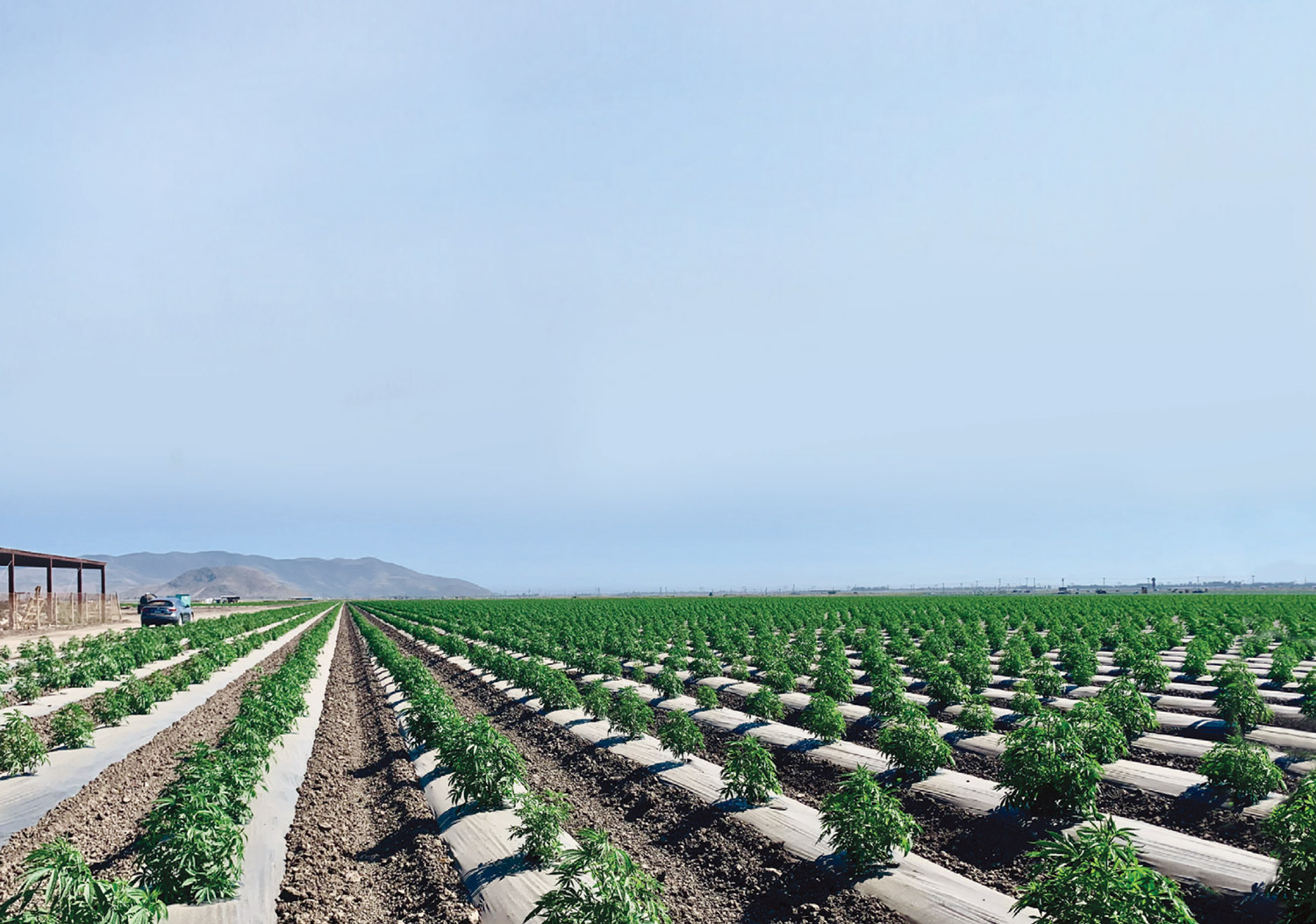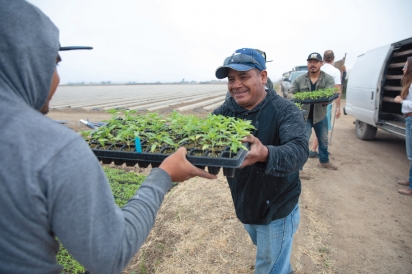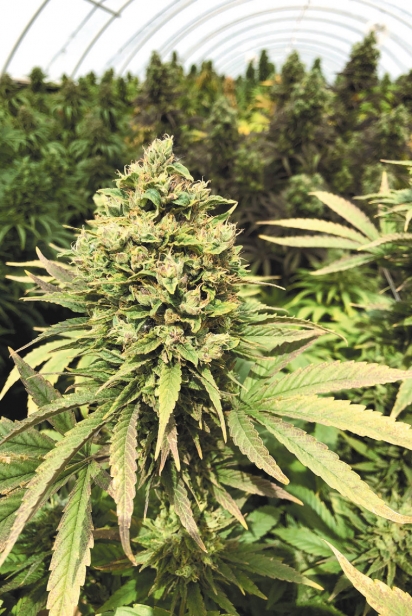High Hopes
The Dubious Future of Ventura County’s Green Rush
What if there was a commercial plant that could be grown in Ventura County that used just a third of the water of vegetable crops, renewed the soil, used minimal (if any) pesticides, and was incredibly profitable?
Chances are, you’ve already heard about it: Industrial hemp is the crop in the center of all the buzz.
Since its cultivation was banned by the Controlled Substances Act in 1970, hemp has been subjected to the same disrepute as marijuana. Although the plants are closely related, industrial hemp does not have psychoactive properties—it won’t get you high. In fact, hemp cannot legally contain more than .03% THC (the main psychoactive constituent in marijuana); the average marijuana plant contains anywhere from 10% to 30% THC.
Back in U.S. colonial days, hemp was widely cultivated for fiber—the first American flag, sewn in 1777, was made of hemp—but all parts of this plant can be used. It’s antimicrobial, rot-resistant and even serves as an excellent food source.
“It’s basically a renewable forest that is grown seasonally, sequesters carbon dioxide and renews the soil,” says fifth-generation farmer and Ventura County Farm Bureau President Will Terry. SB 1409 made hemp legal to farm again in 2018, and across the state, California’s robust agricultural industry has embraced the potential for a new cash crop.
Despite a variety of uses, the product derived from hemp agriculture that has everyone buzzing is CBD oil, which is purported to reduce inflammation and relieve pain in addition to a myriad of other benefits. Companies specializing in CBD have become big business, including local Ojai Energetics.
Founder and CEO Will Kleidon, who is also chairman of the board for the California Hemp Council, says “[Cannabis/CBD] is one of the fastest growing markets globally. It’s not going anywhere. There’s too much job creation and tax revenue at stake.”
According to Ventura County Agricultural Commissioner Ed Williams, the commercial potential of farming hemp for CBD could be as high as $60,000 per acre.
A PIONEER INDUSTRY
Less controversial and stigmatized than marijuana, hemp offers farmers the possibility of earning enough to sustain their operations in areas where land value is at a premium.
“In many ways industrial hemp is an ideal crop for Ventura County,” says John Krist, chief executive officer of the VC Farm Bureau. “It offers significant reductions in groundwater pumping, since it uses less than half as much water as vegetable crops. It’s being grown basically without pesticides or herbicides since very few products are registered for use [with this crop].”
In fact, industrial hemp is promising enough that the Rodale Institute, which performs organic farming research, is setting up a California regional office in Camarillo to study regenerative farming with this crop. Beginning in March, in partnership with Riki Trowe of Ventura Seed Company (VSC) and fifth-generation organic farmer Phil McGrath, the Rodale Institute California Organic Center will be educating and supporting organic farmers and residents throughout the state. VSC cultivates genetically pure hemp seed for farmers around the country and supports regenerative agriculture.
THE INAUGURAL GROWING SEASON
Though VSC began farming organic hemp under the CA Hemp Research & Development project in 2018, 2019 brought the first commercial hemp crops to Ventura County.
“The inaugural season was tough,” Krist says. “We registered around 4,000 acres, although it was probably more like 3,000 or 3,600 that was planted. There’s always going to be problems with starting a new commodity sector from scratch.”
Industrial hemp requires the creation of a whole new value chain, from growing the plant to processing it after the harvest.
Hemp also requires testing by the County to make sure that none of the crop is “hot”—above the maximum .03% THC level. County rules state that farmers must harvest within 30 days of testing, and hemp is notoriously difficult to machine harvest.
“We tried various ways of harvesting,” says Akasha Ellis of VSC. “We combined. We used a forager. We baled. We hand-chopped.”
At VSC they also engineered dryers in the field because city moratoriums on hemp in Thousand Oaks and Camarillo left them unable to lease a building for drying.
Krist was candid about this year’s crop. “Frankly, I’d be surprised if anyone made much money growing industrial hemp this season,” he says. But, “given space to work on these problems, really innovative and creative and efficient growers will solve them.”
THE HEMP BACKLASH
The arrival of the crop in Ventura County was not welcomed by some residents. This past fall saw an outpouring of complaints from local communities, with criticism focused primarily around one issue: the smell. When hemp plants flower, they emit an odor similar to a skunk. Residents argued they suffered from allergies, asthma and nausea from the smell.
Although the odor is strongest only for 30–45 days when plants flower, many cities implemented temporary moratoriums on hemp farming, including Thousand Oaks, Camarillo, Moorpark and recently Fillmore. Ojai permanently prohibited farming before any crops were in the ground, even as one of the only two cities in the county where marijuana can be legally sold.
Farmers and advocates argued for continued hemp permitting at the late fall meetings of the Board of Supervisors as public outcry swelled over the smell from a hemp farm located close to residences in Moorpark. Krist acknowledges that while some smaller operations “may have misjudged where to grow their crops,” these initial errors shouldn’t be met with “the level of animosity displayed in some of the conversations.”
Ellis says he is not aware of any complaints VSC received about their crops. “We purposely said no to land near housing. It was just out of respect because this was our first year ... but that didn’t happen in Moorpark.”
Terry is frustrated by criticism attributing additional crime to hemp crops. “Some thieves were uneducated and thought it was worth a $1,000 a pound, which must have been disappointing for them. But how is that incumbent on the farmer?”
Ventura County Board of Supervisors passed a measure in January that temporarily restricts farming hemp within a half-mile of schools and residential communities; Krist warns that this buffer zone in an urban agricultural environment “essentially puts 90% of the county out of reach” for farmers.
LOOKING AHEAD
While local and small-scale farmers need opportunities for profitable crops, industrial hemp may require education and further conversations to remain in Ventura County.
“We can grow just about anything here, but can you do it profitably?” Krist says. “You need to make up for the very high cost of land and water. [Hemp]’s a thrifty, sustainable crop that has the potential to return high value.”
“There’s so many farmers going bankrupt,” says Ellis, “and they just don’t have a crop that they can compete with. Hemp has the potential to offer farmers a new crop to farm and thus economic vitality.”
If there is a way to allow farmers to grow industrial hemp, while allaying some of the concerns from local residents, perhaps Ventura County can truly tap into a new kind of green gold.










